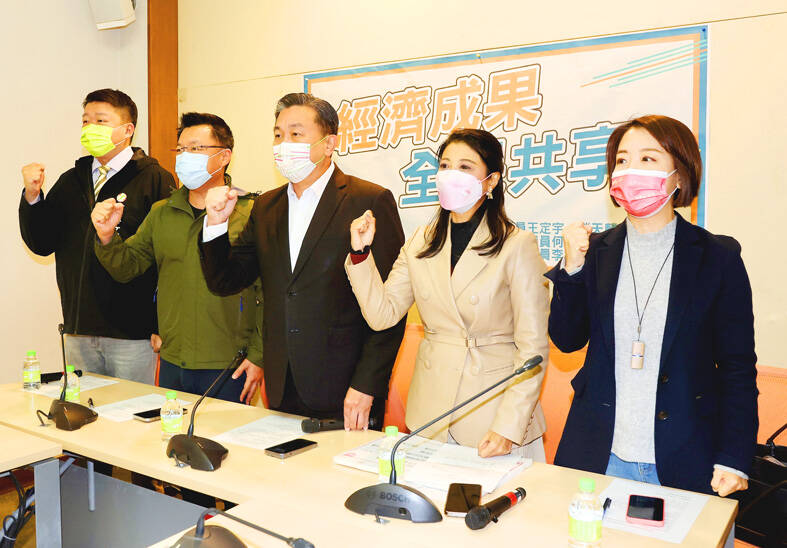The government might issue vouchers to redistribute this year’s surplus tax revenue, the Ministry of Finance said yesterday following a call from lawmakers.
Lawmakers on the legislature’s Finance Committee asked Acting Minister of Finance Frank Juan (阮清華) about the possibility of redistributing surplus tax revenue.
Juan said a redistribution scheme would have to undergo legislative review, so it would be easier to issue vouchers similar to the stimulus vouchers issued to encourage consumer spending during the COVID-19 pandemic.

Photo: CNA
Although tax revenue exceeded the general budget planned for this year, it fell into a deficit when special budgets were taken into consideration, he added.
As such, redistributing the surplus could increase the government’s debt burden and should be carefully deliberated, he said.
Juan promised to bring the issue to the Executive Yuan and discuss it with government agencies.
Separately, Democratic Progressive Party (DPP) legislators Wang Ting-yu (王定宇), Chao Tien-lin (趙天麟) and Michelle Lin (林楚茵) from the party’s Taiwan Forward faction proposed at a news conference ways to return the surplus tax revenue to the public.
Tax revenue in the first 11 months of this year exceeded NT$3 trillion (US$97.69 billion) for the first time, and by the end of the year might exceed the planned budget by NT$450 billion, they said.
The government should return the surplus to the public in cash or voucher form before the Lunar New Year holiday next month, they said.
It should also provide debt relief to 840,000 students in Taiwan and offer further economic relief packages to traditional industries, which were affected the most by COVID-19, they said.
Although Taiwan’s overall economic situation has ostensibly been good during the pandemic, that might only be the case for specific industries such as semiconductors and technology, Wang said.
Traditional industries, including service providers, caterers and food markets, have been struggling, he added.
Many people have complained to Vice President William Lai (賴清德) at local forums that the government’s economic relief packages came with too many limitations and inconveniences, Chao said.
The tax surplus mainly came from corporate income taxes, Lin said, adding that large companies performed well during the pandemic and their factories managed to deliver products on time.
However, the food industry, and small and medium-sized enterprises have been negatively affected by the pandemic, she said.
Former New Taipei City councilor Ho Po-wen (何博文) and former Hsinchu City councilor Lee Yen-hui (李妍慧) of the DPP urged the government to share the surplus with the public so that people can enjoy the Lunar New Year.
Later yesterday, Executive Yuan spokesman Lo Ping-cheng (羅秉成) said that President Tsai Ing-wen (蔡英文) would convene a national security meeting to discuss the issue based on the economic conditions at home and abroad.
The Executive Yuan would make an announcement as soon as a concrete policy is formulated, he added.

A magnitude 5.6 earthquake struck off the coast of Yilan County at 12:37pm today, with clear shaking felt across much of northern Taiwan. There were no immediate reports of damage. The epicenter of the quake was 16.9km east-southeast of Yilan County Hall offshore at a depth of 66.8km, Central Weather Administration (CWA) data showed. The maximum intensity registered at a 4 in Yilan County’s Nanao Township (南澳) on Taiwan’s seven-tier scale. Other parts of Yilan, as well as certain areas of Hualien County, Taipei, New Taipei City, Taoyuan, Hsinchu County, Taichung and Miaoli County, recorded intensities of 3. Residents of Yilan County and Taipei received

Taiwan has secured another breakthrough in fruit exports, with jujubes, dragon fruit and lychees approved for shipment to the EU, the Ministry of Agriculture said yesterday. The Animal and Plant Health Inspection Agency on Thursday received formal notification of the approval from the EU, the ministry said, adding that the decision was expected to expand Taiwanese fruit producers’ access to high-end European markets. Taiwan exported 126 tonnes of lychees last year, valued at US$1.48 million, with Japan accounting for 102 tonnes. Other export destinations included New Zealand, Hong Kong, the US and Australia, ministry data showed. Jujube exports totaled 103 tonnes, valued at

BIG SPENDERS: Foreign investors bought the most Taiwan equities since 2005, signaling confidence that an AI boom would continue to benefit chipmakers Taiwan Semiconductor Manufacturing Co’s (TSMC, 台積電) market capitalization swelled to US$2 trillion for the first time following a 4.25 percent rally in its American depositary receipts (ADR) overnight, putting the world’s biggest contract chipmaker sixth on the list of the world’s biggest companies by market capitalization, just behind Amazon.com Inc. The site CompaniesMarketcap.com ranked TSMC ahead of Saudi Aramco and Meta Platforms Inc. The Taiwanese company’s ADRs on Tuesday surged to US$385.75 on the New York Stock Exchange, as strong demand for artificial intelligence (AI) applications led to chip supply constraints and boost revenue growth to record-breaking levels. Each TSMC ADR represents

TRUST: The KMT said it respected the US’ timing and considerations, and hoped it would continue to honor its commitments to helping Taiwan bolster its defenses and deterrence US President Donald Trump is delaying a multibillion-dollar arms sale to Taiwan to ensure his visit to Beijing is successful, a New York Times report said. The weapons sales package has stalled in the US Department of State, the report said, citing US officials it did not identify. The White House has told agencies not to push forward ahead of Trump’s meeting with Chinese President Xi Jinping (習近平), it said. The two last month held a phone call to discuss trade and geopolitical flashpoints ahead of the summit. Xi raised the Taiwan issue and urged the US to handle arms sales to